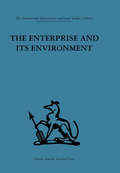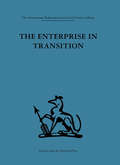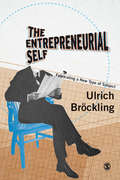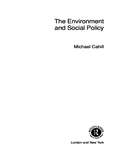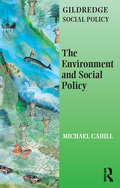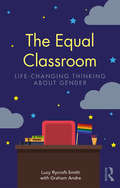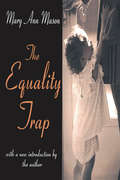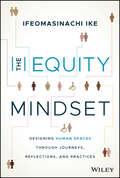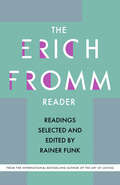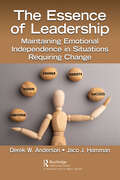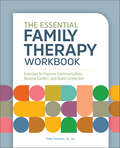- Table View
- List View
The Enterprise and its Environment: A system theory of management organization
by A K RiceTavistock Press was established as a co-operative venture between the Tavistock Institute and Routledge & Kegan Paul (RKP) in the 1950s to produce a series of major contributions across the social sciences. This volume is part of a 2001 reissue of a selection of those important works which have since gone out of print, or are difficult to locate. Published by Routledge, 112 volumes in total are being brought together under the name The International Behavioural and Social Sciences Library: Classics from the Tavistock Press. Reproduced here in facsimile, this volume was originally published in 1963 and is available individually. The collection is also available in a number of themed mini-sets of between 5 and 13 volumes, or as a complete collection.
The Enterprise in Transition: An analysis of European and American practice (International Behavioural And Social Sciences Ser. #Vol. 56)
by H Van Der HaasTavistock Press was established as a co-operative venture between the Tavistock Institute and Routledge & Kegan Paul (RKP) in the 1950s to produce a series of major contributions across the social sciences. This volume is part of a 2001 reissue of a selection of those important works which have since gone out of print, or are difficult to locate. Published by Routledge, 112 volumes in total are being brought together under the name The International Behavioural and Social Sciences Library: Classics from the Tavistock Press. Reproduced here in facsimile, this volume was originally published in 1967 and is available individually. The collection is also available in a number of themed mini-sets of between 5 and 13 volumes, or as a complete collection.
The Entertainment Functions of Television
by Percy H. TannenbaumFirst published in 1980. Routledge is an imprint of Taylor & Francis, an informa company.
The Entrepreneurial Self: Fabricating a New Type of Subject
by Ulrich Bröckling"This is a book about who we are today, and how we have become who we are. It is about the engineers of the modern soul, the entrepreneurial self. It is essential reading for all those who care about the incessant demands placed on us to become more than we are, to become entrepreneurs of our selves, to maximise and optimise our capacities in ways that align personal identity and political responsibility." - Professor Peter Miller, London School of Economics & Political Science Ulrich Bröckling claims that the imperative to act like an entrepreneur has turned ubiquitous. In Western society there is a drive to orient your thinking and behaviour on the objective of market success which dictates the private and professional spheres. Life is now ruled by competition for power, money, fitness, and youth. The self is driven to constantly improve, change and adapt to a society only capable of producing winners and losers. The Entrepreneurial Self explores the series of juxtapositions within the self, created by this call for entrepreneurship. Whereas it can expose unknown potential, it also leads to over-challenging. It may strengthen self-confidence but it also exacerbates the feeling of powerlessness. It may set free creativity but it also generates unbounded anger. Competition is driven by the promise that only the capable will reap success, but no amount of effort can remove the risk of failure. The individual has no choice but to balance out the contradiction between the hope of rising and the fear of decline. Ulrich Bröckling is Professor of Cultural Sociology at the Albert-Ludwigs-University Freiburg, Germany.
The Environment and Social Policy (The Gildredge Social Policy Series)
by Michael CahillFocusing on human welfare and the environment from a social policy perspective, this text shows how environmental concerns are becoming increasingly central to policy-making and discusses the roles of central and local government in relation to environmental issues.The Environment and Social Policy covers the following contemporary topics: sustainability, Local Agenda 21, green ideas, environmental health, housing and urban development, food, work and globalisation. Each chapter starts with an overview of the topic and ends with a list of key points and a guide to further reading. Core concepts are clearly explained and illustrated throughout this text which provides students with a concise and up-to-date summary of what they need to know.
The Environment and Social Policy (The Gildredge Social Policy Series)
by Michael CahillFocusing on human welfare and the environment from a social policy perspective, this text shows how environmental concerns are becoming increasingly central to policy-making and discusses the roles of central and local government in relation to environmental issues.The Environment and Social Policy covers the following contemporary topics: sustainability, Local Agenda 21, green ideas, environmental health, housing and urban development, food, work, globalisation. Each chapter starts with an overview of the topics and ends with a list of key points and a guide to further reading. Core concepts are clearly explained and illustrated throughout this text which provides students with a concise and up-to-date summary of what they need to know.
The Environment and the People in American Cities, 1600s-1900s: Disorder, Inequality, and Social Change
by Dorceta E. TaylorIn The Environment and the People in American Cities, Dorceta E. Taylor provides an in-depth examination of the development of urban environments, and urban environmentalism, in the United States. Taylor focuses on the evolution of the city, the emergence of elite reformers, the framing of environmental problems, and the perceptions of and responses to breakdowns in social order, from the seventeenth century through the twentieth. She demonstrates how social inequalities repeatedly informed the adjudication of questions related to health, safety, and land access and use. While many accounts of environmental history begin and end with wildlife and wilderness, Taylor shows that the city offers important clues to understanding the evolution of American environmental activism. Taylor traces the progression of several major thrusts in urban environmental activism, including the alleviation of poverty; sanitary reform and public health; safe, affordable, and adequate housing; parks, playgrounds, and open space; occupational health and safety; consumer protection (food and product safety); and land use and urban planning. At the same time, she presents a historical analysis of the ways race, class, and gender shaped experiences and perceptions of the environment as well as environmental activism and the construction of environmental discourses. Throughout her analysis, Taylor illuminates connections between the social and environmental conflicts of the past and those of the present. She describes the displacement of people of color for the production of natural open space for the white and wealthy, the close proximity between garbage and communities of color in early America, the cozy relationship between middle-class environmentalists and the business community, and the continuous resistance against environmental inequalities on the part of ordinary residents from marginal communities.
The Environmental Impact of Cities: Death by Democracy and Capitalism (Routledge Studies in Sustainability)
by Robert Vale Brenda Vale Fabricio ChiccaThe Environmental Impact of Cities assesses the environmental impact that comes from cities and their inhabitants, demonstrating that our current political and economic systems are not environmentally sustainable because they are designed for endless growth in a system which is finite. It is already well documented that political, economic and social forces are capable of shaping cities and their expansion, retraction, gentrification, re-population, industrialisation or de-industrialisation. However, the links between these political and economic forces and the environmental impact they have on urban areas have yet to be numerically presented. As a result, it is not clear how our cities are affecting the environment, meaning it is currently impossible to relate their economic, political and social systems to their environmental performance. This book examines a broad selection of cities covering a wide range of political systems, geography, cultural backgrounds and population size. The environmental impact of the selected cities is calculated using both ecological footprint and carbon emissions, two of the most extensively available indices for measuring environmental impact. The results are then considered in terms of political, economic and social factors to ascertain the degree to which these factors are helping or hindering the reduction of the environmental impact of humans. This book will be of great interest to students and scholars of sustainability, urban planning, urban design, environmental sciences, geography and sociology.
The Environmental Psychology of Prisons and Jails
by Richard E. WenerThis book distils thirty years of research on the impacts of jail and prison environments. The research program began with evaluations of new jails that were created by the US Bureau of Prisons, which had a novel design intended to provide a non-traditional and safe environment for pre-trial inmates and documented the stunning success of these jails in reducing tension and violence. This book uses assessments of this new model as a basis for considering the nature of environment and behavior in correctional settings and more broadly in all human settings. It provides a critical review of research on jail environments and of specific issues critical to the way they are experienced and places them in historical and theoretical context. It presents a contextual model for the way environment influences the chance of violence.
The Epistemological Development of Education: Considering Bourdieu, Foucault and Dewey
by Scott Webster Andrew SkourdoumbisThis book documents the political and economic ramifications of the policy impetus for a ‘science of education’ and what this means for classroom teachers, their teaching practices and for the field of education. In a critical exploration of current research and policy articulations of the purposes of education, with attention given to Australia, the UK and the USA, this book delineates the evaluative mechanisms involved in the strategic science as method adoption of accountability, competitiveness and test-driven criteria used in major education policy. It brings together the disciplines of sociology and philosophy by drawing on the theoretical insights of Michel Foucault, Pierre Bourdieu and John Dewey. In addition, the book argues for the deliberate use of the theoretical in education and is against the contemporary unquestioning advocacy that often accompanies a narrowly defined master narrative of a science of education. This book will be of special interest to post-graduate students as source material in general education courses and is also intended for academics with an interest in educational theory/philosophy and the sociology of education.
The Epistemology of Deceit in a Postdigital Era: Dupery by Design (Postdigital Science and Education)
by Jennifer Rose Ibrar Bhatt Alison MacKenzieThis edited book collection offers strong theoretical and philosophical insight into how digital platforms and their constituent algorithms interact with belief systems to achieve deception, and how related vices such as lies, bullshit, misinformation, disinformation, and ignorance contribute to deception. This inter-disciplinary collection explores how we can better understand and respond to these problematic practices. The Epistemology of Deceit in a Postdigital Era: Dupery by Design will be of interest to anyone concerned with deception in a ‘postdigital’ era including fake news, and propaganda online. The election of populist governments across the world has raised concerns that fake news in online platforms is undermining the legitimacy of the press, the democratic process, and the authority of sources such as science, the social sciences and qualified experts. The global reach of Google, YouTube, Twitter, Facebook, and other platforms has shown that they can be used to create and spread fake and misleading news quickly and without control. These platforms operate and thrive in an increasingly balkanised media eco-system where networks of users will predominantly access and consume information that conforms to their existing worldviews. Conflicting positions, even if relevant and authoritative, are suppressed, or overlooked in everyday digital information consumption. Digital platforms have contributed to the prolific spread of false information, enabled ignorance in online news consumers, and fostered confusion over determining fact from fiction. The collection explores: Deception, what it is, and how its proliferation is achieved in online platforms. Truth and the appearance of truth, and the role digital technologies play in pretending to represent truth. How we can counter these vices to protect ourselves and our institutions from their potentially baneful effects. Chapter 15 is available open access under a Creative Commons Attribution 4.0 International License via link.springer.com.
The Equal Classroom: Life-Changing Thinking About Gender
by Lucy Rycroft-Smith Graham AndreHow much thinking have you done about gender? What does it feel like to be gay, trans or non-binary at school? How unbiased, safe and inclusive are our teachers, our schools and our systems, and what can we do about it? The time is ripe for a re-think, and the issues are pressing. Our pupils are grappling with challenges around gender and sexuality, and they need our well-informed support. Providing evidence, prompts and the space to explore the implications, restrictions and constructs of gender, this book is here to help every teacher reflect on issues around gender roles and expectations in their class. In this challenging and potent book, experts, academics and campaigners join forces to contribute important perspectives to complement Rycroft-Smith’s own accessible and often provocative explanations of many facets of gender and sexuality, including media, literature, toys, clothing, sexism, expectations, sexuality, gender roles, harassment and consent. Humour and anecdotes are thoughtfully intertwined with fascinating insights into biological and cultural perspectives and societal norms, highlighting why it’s so vital to teach pupils about gender issues, as well as modelling consent, good quality relationships and tolerance to children at all ages and stages of their school career. Providing clear, practical policy recommendations in an accessible and engaging way, The Equal Classroom is an essential read for any teacher or education professional who wants to ensure their school is a place where all pupils feel truly welcome and able to flourish, comfortable and safe in their emerging identities.
The Equal Rights Amendment (Finding a Voice: Women's Fight for Equal)
by Leeanne GelletlyIt took decades, and a Constitutional amendment, for all American women to get the right to vote. But the legal right to vote did not guarantee equality under the law. Suffrage leader Alice Paul believed another amendment was needed. In 1923, she wrote the Equal Rights Amendment. It was introduced in Congress. And the national debate over the ERA began. The major principle of the Equal Rights Amendment is that gender should not determine any legal rights of citizens. Supporters believed the ERA would keep women from being denied equal rights under federal, state, or local law. The ERA had many opponents in the 1920s. And it had even more in the 1970s, after Congress passed the measure. Although it failed to pass by its 1982 ratification deadline, some people believe the ERA is still alive. They are continuing the effort to put equality for women in the U.S. Constitution.
The Equality Trap
by E. TillyardDespite the feminist revolution of the past twenty years, most women in America are worse off today than at any time in the recent past. Magazines and television programs profile women bank executives, surgeons, and corporate lawyers, but the vast majority of women still work in relatively low-paying jobs. Women work more hours per week in the house and outside than ever before, and a paying job has become a necessity for women in most households. What went wrong? In this provocative book, Mary Ann Mason argues that the women's movement shares some of the blame for this situation. In an original analysis that draws on both social and legal history, she explains how the move away from women's rights toward equal rights has worsened the situation of American working women, especially working mothers. Because women are still the primary care-providers for their children, they must take flexible and relatively low-paying jobs to be available in case of a child-care problem. With nearly 50 percent of all marriages now ending in divorce, and with a growing trend-inspired by the equal rights movement-toward no-fault divorce and low- or no-alimony settlements, divorced mothers frequently find themselves economically devastated. Mary Ann Mason argues that the solution to this predicament is to draw up a new women's rights agenda that will benefit all working women, especially those with children. The equal-rights strategy was important in opening the door for the highly publicized super-achievers, but it is now time, she says, to improve the lives of the majority of America's working women. This book will be of interest to readers interested in gender studies, and particularly issues of equality and feminism. Mary Ann Mason is a professor of law and social welfare at the University of California, Berkeley. In addition to her law degree, Mason holds a Ph.D. in American social history.
The Equity Edge: How Addressing Bias in Recruiting and Retention Drives Success
by Jenn TardyFrom a well-known consultant and speaker, a &“must-read&” (Kevin Grossman) guide to identifying the pain points along the hiring and talent-development process, where bias keeps managers and recruiters from making better decisions More than ever, companies are scrambling to diversify their workplaces. But hiring managers, HR departments, and recruiters remain largely in the dark about how to do this. The Equity Edge lays out the hurdles that face diverse groups of job seekers and employees. At each stage of the hiring and retaining process—finding, attracting, engaging, selecting, and developing talent—managers need to challenge their idea of who is qualified for a job, and potential employees need to know how to navigate the pitfalls of bias. Readers will learn about: The concept of &“underexplored biases&” we can have, from pedigree bias to competitor bias and professionalism bias The importance of having an employment brand that is separate from your corporate brand How to take into account a person&’s Lived Experience Intelligence (LEI), the diverse knowledge, skills, and abilities that they&’ve gained throughout their lifetime How to shift from an unrealistic bias-free ideal to a bias-aware model that promotes proactive acknowledgment and constructive action This book helps experts, leaders, recruiters, and job seekers make better decisions as they navigate the employment cycle.
The Equity Mindset: Designing Human Spaces Through Journeys, Reflections and Practices
by Ifeomasinachi IkeLearn to implement the intentional practices and make the hard decisions that true equity demands In The Equity Mindset, celebrated researcher, attorney, and activist Ifeomasinachi Ike delivers a moving and impactful exploration of why equity is so important, the shortcomings of institutional diversity and inclusion (D&I) initiatives, and how we creatively and boldly design cultures centering the expertise of those who know first-hand how inequity has shaped work culture. The book examines the dynamics of normalized institutional oppression, offers real-world case studies, and provides readers with new practices, key performance indicators (KPIs), and milestones for measuring the success of modern DEI efforts. At its core, The Equity Mindset is about adopting a problem-solving mentality to address social inequities to ensure we all thrive. This nuanced treatment of principles, practices, and production also includes: Practitioner interviews with guidance on how each person, regardless of industry, can advance equity personally and professionally Strategies for addressing organizational bias, inequity, and lack of representation Tools for leaders and decisionmakers seeking concrete steps to create safer cultures for communities historically marginalized A can’t-miss resource for managers, executives, board members, and other business leaders, The Equity Mindset is for those with and without traditional authority who seek to advance the movement for equitable treatment in every environment.
The Erich Fromm Reader
by Erich Fromm Rainer Funk Joel KovelFromm's basic idea was to look at the individual as a social being and to look at society as an ensemble of many individuals who have not only common ideas and convictions based on a common practice of life but also a common psychic structure. With his concept of "social character" he created a new interdisciplinary thinking presented in this reader. The Erich Fromm Reader exhibits the true genius of an original thinker in seeing the connections between overlapping knowledge from many different fields. Here interdisciplinarity is not only a lip service but the impact of Erich Fromm's unique social psychological notion.
The Erich Fromm Reader: Readings Selected and Edited by Rainer Funk
by Erich Fromm&“Fromm crossed the boundaries of traditional disciplines to expound his view on the alienation of man in an increasingly technological world.&” —Newsweek Erich Fromm&’s basic idea was to look at the individual as a social being, and to look at society as an ensemble of many individuals who have not only mutual ideas and convictions based on a common practice of life, but also a shared psychic structure. With his concept of &“social character,&” Fromm created a new interdisciplinary thinking presented in this compendium.The Erich Fromm Reader exhibits the true genius of an original thinker in seeing the connections between overlapping knowledge from many different fields. Here, interdisciplinarity is not only a lip service but the impact of Erich Fromm&’s unique social psychological notion.
The Erotic Motive in Literature (Routledge Library Editions: Literature and Sexuality #2)
by Albert MordellThis work, first published in 1919, is an endeavour to apply some of the methods of psychoanalysis to literature. It traces a writer’s books back to the outward and inner events of their life and to reveal of their unconscious. This unconscious is largely identical with the mental love fantasies in our present and past life. Since the terms ‘unconscious’ and ‘erotic’ are almost synonymous, any serious study of literature which is concerned with the unconscious must deal impartially with eroticism.
The Escape of Sigmund Freud
by David CohenThe &“gripping&” true story of the founder of psychoanalysis—and how he made it out of Austria after the Nazi takeover (The Independent). Sigmund Freud was not a practicing Jew, but that made no difference to the Nazis as they burned his books in the early 1930s. Goebbels and Himmler wanted all psychoanalysts, especially Freud, dead, and after the annexation of Austria, it became clear that Freud needed to leave Vienna. But a Nazi raid on his house put the Freuds&’ escape at risk. With never-before-seen material, this biography reveals details of the last two years of Freud&’s life, and the people who helped him in his hour of need—among them Anton Sauerwald, who defied his Nazi superiors to make the doctor&’s departure possible. The Escape of Sigmund Freud also delves into the great thinker&’s work, and recounts the arrest of Freud&’s daughter, Anna, by the Gestapo; the dramatic saga behind the signing of Freud&’s exit visa and his eventual escape to London; and how the Freud family would have an opportunity to save Sauerwald&’s life in turn. &“Full of fascinating insights and anecdotes . . . Cohen draws copiously on the correspondence between Freud and [his nephew] Sam to paint a vivid picture of their complex and deeply troubled family.&” —Daily Mail &“An illuminating look at the end of the life of a giant of psychology.&” —Kirkus Reviews
The Essence of Chinese Humanistic Culture (China Academic Library)
by Qizhi ZhangThis book presents a comprehensive and inclusive exploration of the core essence of Chinese civilization and its deeply-rooted humanistic values. It goes beyond the surface and delves into the philosophical, ethical, and historical aspects, aiming to unravel the profound characteristics and spiritual significance of Chinese culture. Taking an interdisciplinary approach, the book carefully examines classical texts, traditional values, moral principles, and cultural legacies that have shaped the Chinese humanistic spirit throughout history. By doing so, it offers readers a deep understanding of the rich cultural heritage that China possesses. One of the highlights of the book is its exploration of the relevance of Chinese cultural traditions and values in today’s society. It sheds new light on the significance of the Chinese humanistic spirit in the modern world, demonstrating its enduring importance and its potential to address contemporary issues.
The Essence of Leadership: Maintaining Emotional Independence in Situations Requiring Change
by Jaco J. Hamman Derek W. AndersonThe world is experiencing a leadership crisis. The Essence of Leadership addresses this concern by empowering self-differentiated leadership. The authors draw on family systems thinking, foundational to family therapy, psychodynamic theory, a recognized lens on human nature, and proven process management tools. The core message explored over seven chapters is that a leader’s management of their own anxiety and the anxiety in a system has direct implications for their effectiveness in bringing change. The authors believe that leadership is mastering emotional and relational processes seeking to bring change according to clearly defined goals and ethical principles. As such, leadership is poorly defined as a cognitive-rational, economic, charismatic, democratic, data-based, or expert-driven "How to …" skill. Rather, anxiety’s flow and management greatly determine the likelihood of systemic transformation. After reading this book, leaders will be empowered with a growing understanding of the role anxiety plays in systemic change even as they are equipped to lead with less anxiety. Though the theory and practices in the book are applicable to all leaders, leadership is illustrated through numerous case studies from their extensive experience empowering leaders in both the for profit and nonprofit sectors. Callouts throughout the book, along with questions for reflection, invite the reader into deeper contemplation.
The Essential Comte: Selected from 'Cours de philosophie positive' by Auguste Comte (Routledge Library Editions: Social Theory)
by Stanislav AndreskiAuguste Comte proclaimed himself the founder of sociology and, on the whole, this claim is accepted. His most important work is the six-volume Cours de Philosophie Positive of which this present book is a selective abridgement. Comte, as this selection shows, was a methodological visionary. He was an eminently successful terminological innovator and to him we owe not only 'sociology' and 'positivism' but also 'biology' and 'altruism'. Professor Andreski, in his lucid introduction, assesses Comte's place under six headings, as scientist, philosopher, sociological theorist, sociological historian, reformer and methodologist. But this selection from Comte's works will be most welcomed because it provides a modern English translation of the main body of his thought.
The Essential Family Therapy Workbook: Exercises to Improve Communication, Resolve Conflict, and Build Connection
by Emily SimonianForm a stronger bond as a familyFamilies are complicated—and fostering healthy relationships often takes work. This supportive guide provides you and your loved ones with the therapeutic tools you need to strengthen your connection. Guided by simple exercises, your family will learn how to reduce conflict, boost communication, and build deeper connections. Focus on core family dynamics— Learn how to improve the eight traits fundamental to healthy families, including mutual respect, affirmation and support, and setting boundaries. Explore engaging exercises— Put your newfound knowledge into practice with a range of prompts and activities, such as kindness meditations, conversation calendars, and positive affirmation checklists. Try different approaches — Find the right tools for your family, with a range of therapy techniques including dialectical behavior therapy (DBT), cognitive behavioral therapy (CBT), and narrative therapy. Find fresh perspective and move forward together with help from The Essential Family Therapy Workbook .
The Essential Fromm
by Erich Fromm Rainer FunkAs Fromm points out, ours is "a life between having and being"--between mere having and healthy being, between destructiveness and creativity, between narcissism and productive self-understanding, between passivity and the joy of positive activity. The alternatives of having and being are basic orientations of our character and determine our behavior. The mostly unpublished and unknown texts featured in The Essential Fromm encapsulate Fromm's views on the fulfilling life. To put down roots yet remain free is what the late Erich Fromm called the art of being. It is the secret of happiness.
